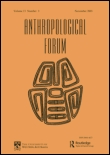
Anthropological Forum
Scope & Guideline
Illuminating the Rich Tapestry of Human Cultures
Introduction
Aims and Scopes
- Cultural Anthropology:
The journal emphasizes in-depth cultural analysis, focusing on the lived experiences of individuals and communities across various contexts, including urban and rural settings. - Political and Economic Anthropology:
Research often explores the intersections of power, governance, and economic practices, examining how these elements shape social relations and individual experiences. - Environmental Anthropology:
A strong focus on the relationship between humans and their environments is evident, with research addressing issues such as climate change, sustainability, and cultural practices related to land and resources. - Indigenous and Postcolonial Studies:
The journal highlights indigenous perspectives and postcolonial critiques, providing insights into the impacts of colonialism and ongoing struggles for sovereignty and rights. - Religious and Spiritual Practices:
Explorations of religious beliefs and spiritual practices are a core area, examining how these elements influence identity, community, and social interactions. - Social Justice and Activism:
The journal frequently addresses themes of social justice, inequality, and activism, focusing on the role of anthropology in advocating for marginalized voices and communities.
Trending and Emerging
- Urban Anthropology:
There is a growing focus on urban environments, exploring how urbanization impacts cultural practices, social relations, and identity formation within diverse populations. - Digital Anthropology:
The rise of digital technology and its implications for social interactions and cultural expressions are increasingly addressed, reflecting the importance of understanding digital landscapes in contemporary life. - Climate Change and Environmental Justice:
Research related to climate change, ecological resilience, and environmental justice is on the rise, emphasizing the anthropological perspective on pressing environmental issues. - Transnational Migration and Cosmopolitanism:
Studies examining transnational migration patterns and cosmopolitan identities are becoming more prevalent, highlighting the complexities of belonging and cultural exchange in a globalized world. - Health and Well-being:
Emerging themes around health, well-being, and the impacts of socio-political factors on health outcomes are gaining traction, showcasing anthropology's role in understanding health disparities and community resilience.
Declining or Waning
- Traditional Ethnographic Studies:
There seems to be a waning interest in purely traditional ethnographic studies that do not engage with contemporary issues. The journal is increasingly favoring research that connects ethnography with current social, political, and environmental challenges. - Historical Anthropology:
Papers focused solely on historical analysis without contemporary connections have decreased. The emphasis has shifted towards studies that integrate historical context with present-day implications. - Methodological Rigor in Classic Approaches:
Classic methodological approaches that prioritize quantitative data over qualitative insights are less frequently represented, indicating a shift towards more interpretive and participatory methodologies.
Similar Journals

Annual Review of Anthropology
Navigating the Landscape of Cultural StudiesAnnual Review of Anthropology is a premier journal published by Annual Reviews, dedicated to providing comprehensive and authoritative reviews in the field of anthropology. Established with the goal of synthesizing essential research findings, this influential publication not only shapes contemporary anthropological discourse but also facilitates interdisciplinary dialogue within the broader realm of social sciences and cultural studies. With an impressive impact factor that places it in the Q1 category across multiple classifications, including Anthropology and Arts and Humanities, this journal is highly regarded by researchers and academics alike. The Annual Review of Anthropology has been a trusted resource for critical insights and transformative ideas, helping to advance the understanding of human societies from 1980 to the present. Although it does not offer open access, access to its articles is available through various academic institutions, ensuring that both seasoned scholars and students can benefit from its wealth of knowledge. With a Scopus ranking placing it in the top percentiles for relevant subjects, this journal is essential reading for anyone looking to stay at the forefront of anthropological research.
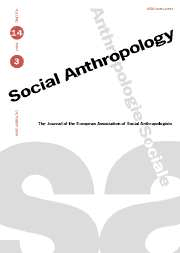
Social Anthropology
Connecting Ideas Across Cultures and ContextsSocial Anthropology is a leading journal published by BERGHAHN JOURNALS, focusing on the diverse and dynamic field of anthropology. With an ISSN of 0964-0282 and an E-ISSN of 1469-8676, this open-access journal has been a cornerstone of scholarly communication since its inception in 1982, becoming fully accessible to the public since 2022. Situated in the United States, the journal aims to disseminate high-quality research that explores sociocultural dimensions of human behavior across various contexts, addressing pressing contemporary issues through a multidisciplinary lens. With impressive rankings, including Q2 in Anthropology and Arts and Humanities, and strong positions in Sociology and Developmental Psychology according to Scopus metrics, Social Anthropology serves as an essential platform for researchers, professionals, and students committed to advancing our understanding of social practices and cultural norms. Its commitment to fostering intellectual discourse makes it a vital resource for those seeking to deepen their knowledge and insight into the anthropological landscape.

Anthropology Today
Unveiling Insights into Societal TrendsAnthropology Today, published by WILEY, is a leading peer-reviewed journal in the field of anthropology, boasting a distinguished Q1 category ranking in the 2023 evaluations and a notable position within the top 79th percentile of its discipline according to Scopus. Established in the United States, this journal offers a rich compendium of contemporary anthropological research, covering diverse topics that shape the understanding of human cultures and societies. It is recognized for its rigorous academic standards and commitment to publishing innovative studies that reflect current trends and discussions within the field. While the journal is not open access, it provides insightful articles and reviews that are indispensable for researchers, professionals, and students seeking to enhance their knowledge and stay updated with the latest anthropological findings and theoretical advancements.
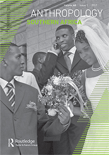
Anthropology Southern Africa
Elevating the discourse in anthropology and cultural studies.Anthropology Southern Africa is a prestigious journal published by Routledge Journals, Taylor & Francis Ltd, and is dedicated to advancing the field of anthropology through rigorous scholarship and critical discourse. Established in 2013 and converging through 2024, this journal sets a high standard in its category, currently holding a Q2 classification in Anthropology and a Q1 ranking in Cultural Studies for the year 2023, ensuring its position as a significant contributor to social science research. With a robust Scopus ranking that places it in the 82nd percentile for Cultural Studies and the 67th percentile for Anthropology, Anthropology Southern Africa serves as an essential platform for researchers, professionals, and students engaged in anthropological inquiry and cultural analysis. Although it is not openly accessible, the publication prides itself on high-quality submissions that explore diverse cultural phenomena and anthropological perspectives, thereby inviting interdisciplinary engagement and fostering a global academic dialogue.

Focaal-Journal of Global and Historical Anthropology
Pioneering Insights into Anthropological PracticesFocaal-Journal of Global and Historical Anthropology is an esteemed academic journal published by BERGHAHN JOURNALS, focusing on the intricacies of global and historical anthropology. With an impressive impact factor and positioned in the Q1 category of anthropology for 2023, this journal is recognized for its exceptional contributions to the field, ranking #121 out of 502 in the Social Sciences category on Scopus. Since its transition to Open Access in 2020, Focaal has made significant strides in democratizing academic knowledge, allowing broader accessibility for researchers, professionals, and students worldwide. The journal provides a platform for interdisciplinary dialogue and critical analysis, paving the way for innovative research and thought-provoking discussions. With a commitment to fostering a deeper understanding of anthropological practices and their global implications, Focaal is an essential resource for anyone engaged in contemporary anthropological studies.

Nature + Culture
Advancing Interdisciplinary Insights on Nature and CultureNature + Culture, published by BERGHAHN JOURNALS, focuses on the interdisciplinary exploration of cultural and environmental relationships, bridging the gap between the social sciences and ecological studies. With its ISSN 1558-6073 and E-ISSN 1558-5468, this journal has established itself as a key platform for scholars aiming to advance discussions in an era of rapid environmental change and cultural transformation. Operating from the United States, specifically at 20 Jay St, Suite 512, Brooklyn, NY 11201, it holds a respectable position within the academic community, evidenced by its Q3 ranking in Social Sciences (miscellaneous) for 2023 and its Scopus rank of #132 out of 275 in General Social Sciences. While currently not an Open Access journal, Nature + Culture provides vital insights that address the pressing issues of our time, making it an essential resource for researchers, professionals, and students committed to understanding the intersection of nature and human culture from 2008 through its converging years into 2024.

INTERNATIONAL JOURNAL OF AFRICAN HISTORICAL STUDIES
Exploring Africa's Rich Tapestry of HistoryInternational Journal of African Historical Studies is a leading academic journal published by the African Studies Center at Boston University. With its ISSN 0361-7882 and E-ISSN 2326-3016, this journal serves as a vital platform for scholarly discourse in the fields of History, Cultural Studies, and Sociology. Renowned for its rigorous peer-reviewed research, the journal holds a commendable Q1 ranking in History and Q2 in Cultural Studies as of 2023, highlighting its influence and contribution to African historical scholarship. The journal has been published since 1976, consistently providing insightful analyses and critical research that engage with Africa's past and present, thereby enriching our understanding of global histories. Although it does not offer an open-access model, the journal is accessible through various academic databases and institutions. Its mission is to foster a deeper understanding of African histories by publishing high-quality, innovative research that reflects diverse perspectives, making it an essential resource for researchers, professionals, and students dedicated to the study of African history and cultural dynamics.

Boletin Antropologico
Bridging Knowledge and Culture in AnthropologyBoletin Antropologico, published by UNIV LOS ANDES, is a vital academic journal dedicated to the field of anthropology, focusing on the diverse cultural practices, social structures, and historical contexts of societies, particularly within Latin America. With its ISSN of 0257-750X, this journal aims to provide a platform for researchers and scholars to disseminate their findings and engage in meaningful discussions that advance the understanding of anthropological issues. Although Boletin Antropologico currently does not follow an open-access model, it remains a significant resource for professionals seeking peer-reviewed content that reflects rigorous academic standards. With a commitment to fostering intellectual growth and collaboration among anthropologists, the journal serves as an essential reference for students and practitioners keen on exploring the rich tapestry of human cultures and societies.
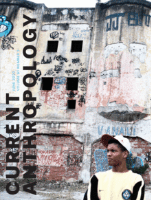
CURRENT ANTHROPOLOGY
Elevating Knowledge in Anthropology Since 1962CURRENT ANTHROPOLOGY, published by the esteemed University of Chicago Press, stands as a premier journal in the fields of anthropology and archaeology, with an impressive impact factor that signifies its relevance and authority in the academic community. With both print (ISSN: 0011-3204) and digital formats (E-ISSN: 1537-5382), this journal provides a platform for groundbreaking research, theoretical advancements, and critical discussions that shape our understanding of human cultures and societies. Since its inception in 1962, CURRENT ANTHROPOLOGY has continually pushed the boundaries of knowledge and inquiry, earning a prestigious Q1 ranking in 2023 across multiple categories, including Social Sciences and Archaeology. Researchers and professionals alike rely on this journal not only for its rigorous peer-reviewed articles but also for its commitment to interdisciplinary approaches and innovative methodologies. While not currently offering open access, CURRENT ANTHROPOLOGY remains an essential resource for students and scholars eager to stay abreast of the latest developments in anthropological research.
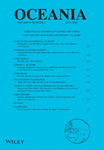
OCEANIA
Exploring the Depths of Culture and ScienceOCEANIA, published by WILEY, is a distinguished journal that has been fostering scholarly discourse in the fields of anthropology and the history and philosophy of science since its inception in 1930. With an impressive impact factor and secure positions in the Q2 quartile for both categories, OCEANIA stands out as an influential resource for researchers and professionals alike. Its latest Scopus rankings reflect its commitment to quality, placing it in the 76th percentile for history and philosophy of science and the 66th percentile for anthropology. Though it does not operate under an open access model, the journal provides robust access options for institutions and individuals to explore its rich array of peer-reviewed articles that contribute to the understanding of cultures and scientific thought across the Pacific region and beyond. As we advance toward its continued convergence into 2024, OCEANIA remains a pivotal platform for innovative research and academic debate, cultivating insights that are crucial for scholars and students navigating the complexities of these interconnected disciplines.